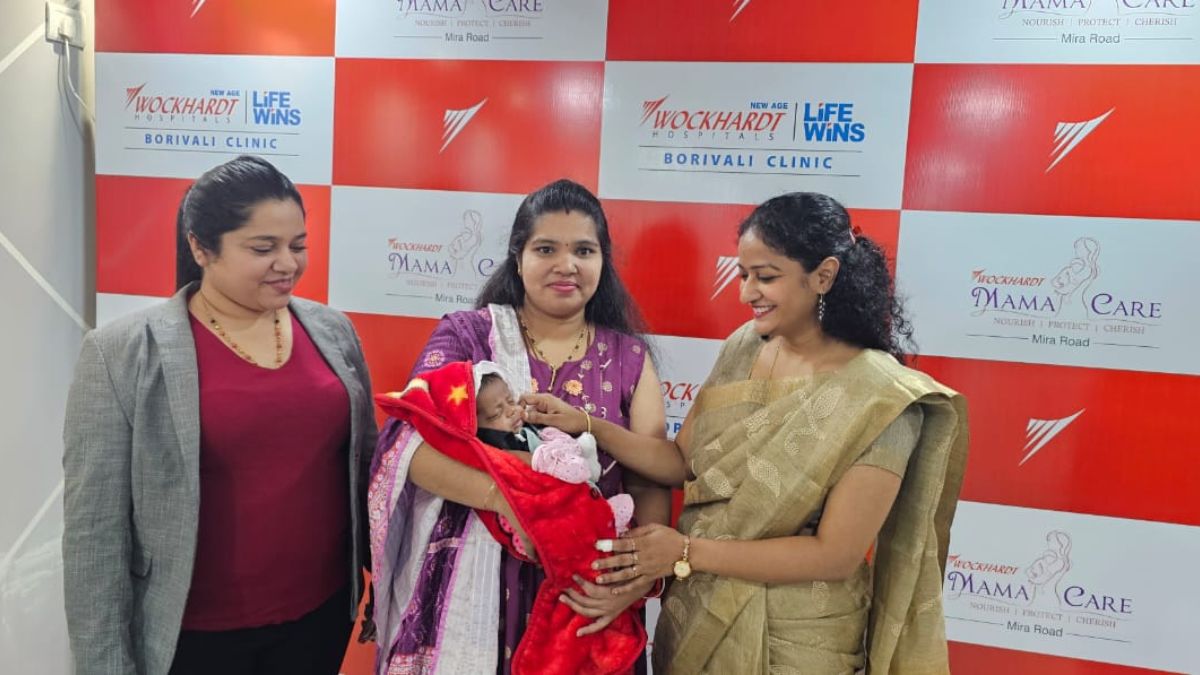
The birth of a child can be called one of the most anticipated events in a person and their parents’ lives. The lengths to which parents go to ensure the mother’s and the baby’s health and well-being can be seriously disappointing and anxiety-inducing if the child or the mother suffers a complication at this delicate time. However, modern medicine and medical advancements have given us the gift of life. Rare complications that we could not even imagine conquering in the past are no more a dire sentence, regardless of a person’s financial standing.
In one such admirable and hope-inducing case, a baby’s life was saved in a rare case of Umbilical Cord Prolapse (UCP) at Wockhardt Mama Care, Mira Road (Wockhardt). Rita Dharaviya, a 30-year-old woman from Borivali, arrived at the emergency room of Wockhardt Mama Care in preterm labour. Upon vaginal examination, it was discovered that her umbilical cord had prolapsed, posing a serious risk to the baby.

Premature Baby Suffers Umbilical Cord Prolapse
An overview published in the National Library of Medicine defined UCP as a rare life-threatening emergency that develops during pregnancy, labour, or delivery. In this complication, the umbilical cord, which is a tube connecting the foetus to the placenta, exits the cervical opening before the foetus.
Talking to the team of OnlyMyHealth, Dr Rajashri Tayshete Bhasale, Consultant Gynecologist & Obstetrician, Laparoscopic Surgeon, Wockhardt Hospitals, Mira Road one of the doctors who played a pivotal role in saving Rita’s baby, shared that this rare complication occurs in only 5% of the pregnant population. A 2017 study published in the Journal of Perinatal Medicine concluded that UCP poses a 7% higher risk of foetal mortality.
Explaining Rita’s case, Dr Bhasale said, “When Rita came to us she was in the 7th month of her pregnancy. She suffered a premature rupture of the membrane or water breakage and was in unbearable pain. The foetal heart rate was 100 as compared to the normal heart rate of 140. Her labour pains began, accompanied by amniotic fluid leakage and protrusion of the umbilical cord.”
Explaining the complications posed by UCP, she said, “UCP can lead to compression and reduced oxygen supply to the baby. Immediate delivery is crucial to prevent potential issues such as brain damage or death.”
Also Read: Delayed Cutting of Umbilical Cord Healthy for Newborn

Treating Umbilical Cord Prolapse
Due to the life-threatening situation, the decision was made to proceed with an immediate delivery to save Rita's baby's life. Dr Bhasale said, “Within a few minutes, the mother was transferred from the emergency department to the operation theatre for delivery to address this complication.”
“A caesarean section was performed on September 27th and a 1 kg baby was delivered in less than 20 Minutes from door-to-incision time,” added Dr Bhasale. She credited cutting-edge technology that enables the team looking after Rita’s case to closely monitor foetal health, manage potential complications, and respond promptly to any further emergencies.
Further explaining the baby’s treatment after the operation, Dr Nitu Mundhra, Consultant Neonatologist, Paediatrician, and Lactation Expert, Wockhardt Hospitals, Mira Road, told the OnlyMyHealth team, “The premature baby showed signs of distress, requiring admission to the neonatal intensive care unit after delivery. The baby received non-invasive ventilator support and a surfactant to aid in lung development. After 10 days of care, the baby's health improved significantly, allowing for discharge in a healthy condition with the optimal weight.”
Also Read: Expert Explains The Importance Of Umbilical Cord Care

After the baby’s discharge, Rita expressed, “The emotional rollercoaster of my pregnancy reached its peak when I found myself facing a complex delivery and the fear of a probability of an uncertain fate of my unborn child. As the team swiftly took charge, their accuracy and care left me in awe, and I knew that my baby was in safe hands.”
Dr Mundhra said, “Subsequent follow-up appointments have shown that the baby is meeting developmental milestones appropriate for his age and is exclusively feeding on breast milk.
Also Read: Obesity Increases The Impact Of Pregnancy Complications On The Heart: Study
Fortunately, the infant is now thriving and meeting developmental milestones appropriate for its age. Rita’s pregnancy complication highlights how far the medical society has come, and the need to prioritise personalised care, ensuring that each expecting mother receives individual attention tailored to her specific needs. This enhances patient safety and comfort during such a challenging time, paving the way for reduced prenatal mortality and healthy mothers and infants.
Also watch this video
How we keep this article up to date:
We work with experts and keep a close eye on the latest in health and wellness. Whenever there is a new research or helpful information, we update our articles with accurate and useful advice.
Current Version